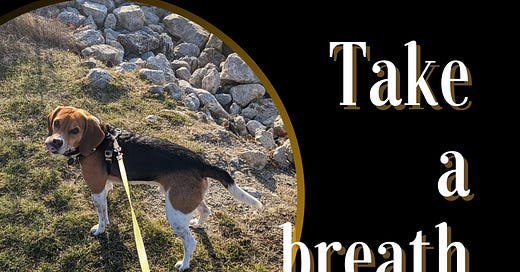Two individuals, both authors, have reminded me recently to take a breath, although their reasons were vastly different.
The first person, James Nestor, wrote an entire book about breathing just to inform us that we’re doing it wrong. Imagine that! If you happen to come across the book Breath, available in all the various formats pervalent today, I encourage you to pick it up and read or listen to it. Because Mr. Nestor’s advice, on how to breathe properly for optimal (or improved) health is based on both personal experience and science.
The second person, Scott Adams, wrote a book called Reframe your Brain, whereby he’s not telling us how to breathe, but rather not to forget to breathe. I had the book loaded on my Libby app in my phone and sadly it disappeared before I had a chance to finish it, but there is a visual he described in his first chapter which I could relate to quite accurately.
Mr. Adams was talking about walking a dog for the purpose of getting some exercise, but because of the dog’s endless sniffing, a lack of forward movement was instead achieved. He found himself getting annoyed at the constant stopping and dragged the dog along, against the poor thing’s will, just so he could get on with his day.
I understand this on some level. I have a beagle, a breed known to have highly advanced scent receptors. Ask me how much time I spend walking Tucker as opposed to standing still while he sniffs himself into a seemingly state of bliss and I will tell you ‘not much’.
On a day when I don’t have to chauffeur anyone to and fro nor have other pressing commitments to keep, I don’t care how long Tucker takes to sniff unsavory things on our walk. But on the days I have limited time for whiling away at the park, I get impatient and try to hurry him along.
In Reframe your Brain, Mr. Adams recommends a change in perspective. Instead of feeling annoyed, try feeling relaxed (I’m paraphrasing). He says that standing still while the dog is doing his sniffing gives the human at the other end of the leash the perfect opportunity to take a breather.
While the dog sniffs, you take a long, deep, conscious breath.
Consider this:
Humans are said to have about 5 million scent receptors, whereas dogs have about 225 million. (Source: https://www.akc.org/expert-advice/dog-breeds/what-do-police-dogs-do/)
When you consider how much more valuable sniffing is to dogs than it might be to us humans, then perhaps letting them sniff as long as they want to will provide them with something equitable to exercising. Sniffing for dogs it kind of like reading or scrolling social media. Besides, mental tiredness in dogs is as effective as physical tiredness; I know, because after a short distance walk which took a long time to complete because of the sniffing, Tucker is quiet for many hours.
This is helpful to me, particularly on the days I have a lot to write.
I was reminded of Mr. Adam’s suggestion - to take a breath - once again today. Tucker was sniffing a rusty fence post, a pile of leaves, an old soda can and some other, questionable debris at the entrance of the park while I stood on a soggy path getting wet and cold. It was rain-snowing and I was miserable. Just a few steps ahead was a tree canopy which would have sheltered me from the elements if only Tucker would have let me tug him away from whatever enticing smell he refused to part with.
Tucker refused to budge.
Did you know beagles are a particularly stubborn breed? Well, now you know.
Nothing I tried to entice the little maniac hound to move along allowed me to pull the 30-pound dog away from his oilfactory bliss.
So, I took a breath. But not just any old breath, I breathed in through the nose just like Mr. Nestor explained, long and deep until my lungs were completely full, held it in for a count of four, then slowly but puposely exhaled through the mouth until all the air was gone. Then I did it again.
After a while, Tucker was on the move following his nose to the next disgusting thing to inspect and we trotted from tree to tree, post to post, leaf pile to leaf pile. I found a rhythm which kept pace with another form of breathing called box breathing: in the nose for four, hold for four, exhale through the mouth for four, hold for four.
By the time we got home we were both soaked. But, I must admit, I felt less anxious and less agitated than I did before we went for the walk. All that oxygen flowing through my veins made a difference.
Breathing properly, as it turns out, is good for your health. And, as mentioned, Tucker spent the next three hours quietly sleeping on the couch.
Thank you for reading me here on Substack! This is my first post. If you like my content please subscribe. It’s free! I have not yet installed a paywall and I have not yet decided if or when I will do so.




